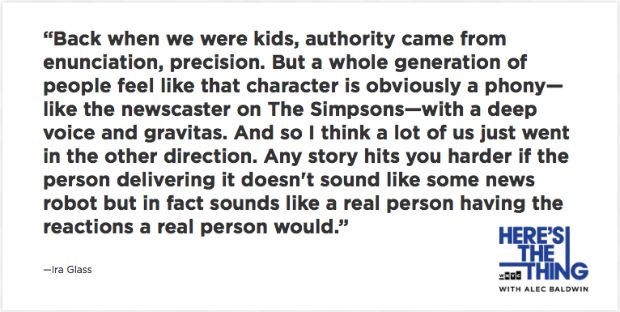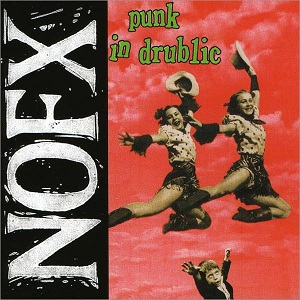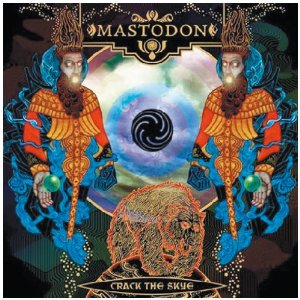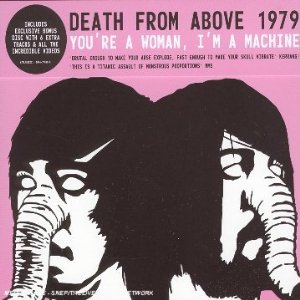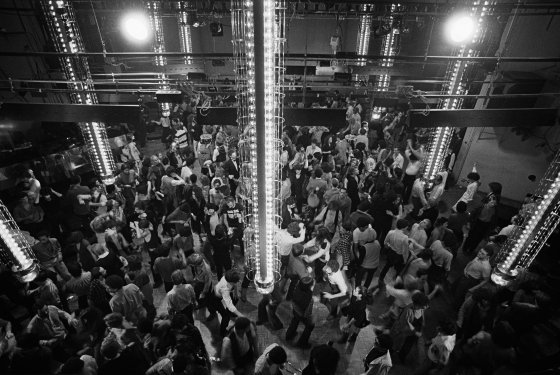Alec Baldwin sits down with Ira Glass to compare notes on interviewing, the afterlife, and how to find one’s voice – with a microphone or a camera lens. Now the veritable kingmaker of public radio, Glass has revolutionized nonfiction storytelling by using a voice that’s personable, modest, and emotionally engaged. In this extensive interview, Glass lays it all out: politics (he’s a Democrat; finds the left insufferable), religion (went through Hebrew school; done with it), fact-checking (you can never be too careful), and that dog who went as him for Halloween.
Bob Dylan Plays Concert for One Lucky Superfan
From Rolling Stone:
Yesterday afternoon around 3:00 p.m. 41-year-old Bob Dylan superfan Fredrik Wikingsson walked into Philadelphia’s Academy of Music, took a seat in the second row and prepared to watch his hero play a concert just for him. “At this point I still thought I was about to get Punk’d,” he says. “I thought some asshole would walk onstage and just laugh at me. I just couldn’t fathom that Dylan would actually do this.”
The incredible concert was part of an ongoing Swedish film series Experiment Ensam (Experiment Alone), where people experience things completely alone that are usually reserved for large crowds. Past films focused on lone people at comedy clubs or karaoke bars. The filmmakers thought a lot bigger for this one and made arrangements with Dylan’s camp for the private show, paying him an undisclosed amount of money. “I have no idea how much it was,” says Wikingsson. “But it was probably more than he gets for a normal gig.”
Wikingsson’s private Dylan show was filmed by eight cameras, and a 15-minute documentary of the event will hit YouTube on December 15th. “Fans might detest the fact that I’m sitting there,” he says. “But it’s going to be really cool and great looking. The sound was just incredible.”
Jarvin Cocker’s Advice For Creative Artists
Pitchfork: As someone who’s maintained a creative lifestyle for about 30 years now, what advice would you give to someone who’s considering that path now?
JC: One of the problems of our modern world is that there’s a lot of things to work through, but, at some point, everybody should take a pause from that and make something, so that it’s not just all one-way traffic. Human beings aren’t meant to be solely consumers—eventually, something has to come out. Otherwise, I don’t really see what the point of all that consumption is. The idea behind watching things and listening to things is that it stirs something within you, and hopefully that will stimulate you to then create your own thing.
I love the Internet, but it’s hard not to get lost in it. It’s not like a book where you start and get to the end. It’s like we’ve found a way to encapsulate all of human knowledge within one thing only to learn that you can’t do that. It’s an overabundance of information. Ultimately, it must be quite tough to be confronted with that. If you wanted to be a creative person and you are confronted with the sum product of mankind’s creativity up to this moment in history, that’s pretty daunting, like, “Where can I fit my voice in amongst all that?”
Pitchfork: Yeah, the idea of making something new can seem pointless because you know it’s going to be thrown on top of this endless pile of stuff.
JC: What people have to make sure of is that they’re not replicating something that already exists. You really have to ask yourself: “Is there a point in me doing this? Has this already been said before? Is this moving things along or is this just adding to the giant pile of junk that’s already there?” Social commentators give this kind of idea names like “cultural gridlock,” where things like music don’t seem to be developing so much. It’s not like the music of 1994 is that different than the music of 2014—and that’s 20 years worth.
But I believe that humans adapt to circumstance. The Internet is quite an unprecedented circumstance, so it’s going to take people a while to get their heads around it. You read things about writers, for instance, who get computer programs so that they can’t surf the Internet when they’re supposed to be writing. People are learning that you’ve got to find some way of shutting things off in order to give your own mind a chance to produce something. It’s interesting that most gadgets are called “iPhone” and “iPod,” with that “i” prefix, which is ego. But most creativity is not ego-led—a lot of it comes from the unconscious. So if you’re always checking your email or updating your Instagram profile, you’re not just looking out the window, daydreaming. You’ve got to let the subconscious in—that’s my main message to the world. I sound like I’ve been reading too many self-help books, don’t I?
Via Pitchfork
Watch Fred Armisen Improvise New York Accents For Nearly Five Minutes
Portlandia star Fred Armisen improvises a startling number of New York City neighborhood accents for five minutes.
Watch 14-Year-Old Taylor Swift In High School Video Project
At 14 years old, the same year she signed her first song publishing deal in Nashville, Taylor Swift was a natural on camera.
She and some classmates had to put together a video project, so they came up with a fictional company called Paco’s Paradise Smoothies and made a commercial for it. Swift gets the indispensable role of “Island Girl 1.”
I’m not even going to tell you when she comes in – you’ll know.
The Music Industry’s Most-Loved Albums Of All Time, Part 29
This is part 29 of an ongoing series where the kind folk of the music business reveal their favourite album of all time.
Ask people in the music industry the seemingly simple and straightforward question, “What is your favourite album of all time?” and you’ll find that it’s not always easy. After all, my industry peers listen to hundreds of albums a month – thousands of songs during that time. Because the question isn’t the best album of all time – the one that’s made them the most money in sales – but the one release they personally can’t live without, that one title they have two copies of in several formats, in case one breaks. It’s also about that album that for them has the best back stories and the one that has the most meaning in their lives.
Terry Makedon, Editor In Chief of T-Mak World
The Dark Side Of The Moon, Pink Floyd
With no hesitation and no doubt in my mind, Pink Floyd’s The Dark Side Of The Moon is the answer. There is clearly a reason why it has sold almost 50 million copies and has been on the Billboard charts for 30 years. If I had a way to prove it, I would bet anything that this album will still be considered a masterpiece 300 years in the future much like we consider Beethoven or Mozart compositions in the same regard. There will be tribute bands trying to accurately reproduce the sounds that Pink Floyd laid down and there will be discussions about how the topics are relevant then. The production techniques of this album are so far ahead of their time that even now most albums can’t come close to the chilling effects and clarity of sound on Dark Side Of The Moon. The album cover is so iconic that it defines the Pink Floyd brand and sets the standard for album covers. Although musically the album is excellent, it are the lyrics and concepts that Roger Waters laid out that take it to a different level.The record gives a bitter description of human mortality in “Time” with a dire warning to not waste your finite time in this world. Greed and commercialism are what “Money” deals with and the wordless “Great Gig In The Sky” always induces goosebumps. Us and Them is a powerful song about war and the manipulation of the masses by those in power. This album has been the soundtrack of my life, and has been with me everywhere – I have a 30+ year tradition that I still follow to this day. Every time I am on vacation at a beach I will put on headphones and start up The Dark Side Of The Moon and spend 43 minutes staring at the waves rolling into the sand and somehow become one with the music. Trippy – but it is Pink Floyd after all.
Dustin Jansick, Editor-in-Chief, Way Too Indie
Punk in Drublic, NOFX
1994 was a great year for music. The year included gems like Weezer’s “Blue Album”, “Roman Candle” by Elliott Smith, and one of my favorite Built to Spill albums, “There’s Nothing Wrong with Love”. It was also the year NOFX released their fifth album “Punk in Drublic”. While the formerly mentioned albums might have more play counts in my iTunes library, the latter had the greater affect on me. This album tackles political topics, racial issues, and even some religious satire. But most importantly, “Punk in Drublic” contains good ol’ fashion punk rock–aggressive guitar riffs, energetic drum beats, and deviant attitude . It’s a complete album from front to back, beginning with the explosive song “Linoleum” and ending with the serene melody of “Scavenger Type”. And it’s best when listened to from start to finish. Which is easy to do since most songs are about two minutes long (don’t be fooled by that seven minute song at the end, most of the runtime is due to the hidden track). “Punk in Drublic” may not be the perfect album nor the one I listen to the most, but it’s one that I never get tired of hearing.
Ian T. D. Thomson, Host of the 7 Deadly Songs, CJUM 101.5
Crack the Skye, Mastodon
I was 16 years-old when I first heard of Mastodon. In a copy of Rolling Stone magazine, I was introduced to the bearded band and Brent Hind’s gnarly tribal face tattoo. I was immediately sold. I set out to purchase their latest album, without hesitation and without hearing a note of their music.
I don’t consider myself a massive metal fan. You won’t see me in a mosh pit and I certainly don’t know all the detailed sub-genres of the field (Deathgrind anyone?). Yet, Mastodon’s Crack the Skye is an album I don’t think I will ever grow tired of. This gargantuan 7-song concept album by the Atlanta quartet has a concise fluidity from track to track, yet each song feels like an adventure. One is truly sent on a wild ride through space and time with a storyline I still don’t think I fully comprehend (I believe it is about a man is space sucked into a wormhole and then put in the body of Rasputin?) To me, it really opened a wide range of possibilities of what an album can be, despite boundaries placed by its developed genre. The ability to play complex, hard, loud or fast riffs on distorted guitars and drums often defines metal, however this can sometimes limit what emotions can be portrayed. In the process, emotion and “soul” on a metal track can sometimes be lost or simply seen as “2-dimensional”. On Crack the Skye, Mastodon is able to pair sincere emotional displays with intense musical arrangements, giving metal fans their melodic complexity as well as a brand-new listening experience. While the initial purchase may have been an impulse buy, it is still probably one of the best musical purchases I have made. I still find myself coming back to this album with a new appreciation for the music and it’s the tracks.
Ian Gregg, Director of Programming at CFUR Radio, Prince George BC
You’re a Woman, I’m A Machine, Death From Above 1979
I first heard the single “Romantic Rights” on a late night Much Music show, around the time of night when tracks outside of the top 40 started to play. Rage Against the Machine were under my belt, but a lingering naivety on things like Darude and mainstream rap muddled with my taste as well. I couldn’t figure out what I heard, though I knew I liked it. How was that much sound coming form two people? How was this “rock” song so complex? It wasn’t heavy metal, it wasn’t rock, it wasn’t anything but good. When I tracked down the album after ages of scrounging through northern AB record sellers, I prioritized the purchase above all else, and was quickly rewarded. Romantic Rights became the tip of the iceberg as the rest of the album crashed through my headphones. The rest of my life has been forever better.
Pierre the French bulldog puppy takes a leap of faith
A French bulldog, Pierre, was only nine weeks in this video, and had never jumped off the couch before. He decided that this was the day he would attempt it, and he does it like a boss.
http://youtu.be/PiZqh2QgNJU
Nile Rodgers on Writing ‘Le Freak’
The last incarnation of our black rock band was called the Big Apple Band. We were R&B, fusion, jazz, rock-and-roll. One of the guys I had gone to school with had a major hit record called “A Fifth of Beethoven”—Walter Murphy and the Big Apple Band. People thought that was us, so we changed our name to Chic. I wrote our very first song for this new entity: “Everybody Dance.” We premiered it at a club called the Night Owl Cafe. From this one club, the song blew up, and the whole scene would go there just to hear this song.
That song and “Dance, Dance, Dance (Yowsah, Yowsah, Yowsah)” became big records in the underground scene and they were popular on the radio. Grace Jones, who was a goddess in those days in the club scene, expressed interest in having me and Bernard Edwards write and produce her next album. This was huge! We only had one record under our belts, and we get a call from Grace Jones? But we had never spoken to her, so on the phone she had this very bizarre vocal affectation. We thought she was putting on this voice for us as part of her code message on how to get into Studio 54. So she says, “Tell them you’re personal friends of Miss Grace Jones.” [Said in a faux-Austrian accent.] We knock on the door and say, “We are personal friendzzz of Meees Graaaysss Jones,” and the guy slams the door in our faces and tells us to fuck off. And we say, “No, no, no. Seriously,” and we try and get it better. “Weeee’re personal friendzzz of Meeeesss Graaaaysss Jones.” We sound like Bela Lugosi. He slammed the door in our faces again. So we went to my apartment and started jamming on a groove, like “Aww, fuck off! Fuck Studio 54!” And it sounded great. Then Bernard, in his infinite wisdom, said, “My man, you know this shit is happenin’, right?” And I was like, “How are we gonna get ‘fuck off’ on the radio?” So we changed it to “Freak Off.” And Mr. Hippie, the acid head in me, said, “You know, like how about we call it ‘Freak Out’?” Bernard was like, “What does that mean?” And I was like, “You know, when you drop a tab of acid, man, and things go bad. Or, how about, you know when you go to a club and you’re freakin’ out on the dance floor.” And Bernard said, “My kids are doing that new dance called the ‘Freak.’ ”
So we took this negative experience and turned it into a positive one, and we talked about being in Studio 54 dancing this new dance. We took Chubby Checker’s “The Twist” and Joey D and the Starliters’ “ Peppermint Twist” and made it be about the “Freak.” To make it sound like it was ours, we called it “Le Freak.” But we didn’t tell people how to do the dance because we didn’t really know how to do it. It became better to speak of it in this euphoric way, and talk about the experience of doing it. We say, “Have you heard about the new dance craze.” We assume you haven’t. “We’ll show you the way.” But we don’t! The dance never became “the Twist” or even “the Hustle.” But the song is a triple-platinum single. And when we were on American Bandstand, Dick Clark introduced us in a really wonderful way. He said, “This is the biggest song by a band nobody knows about a dance that nobody knows how to do. Ladies and gentlemen, Chic! ‘Le Freak’!” It was so right on the money.
Via Vulture
Tom Petty On Fame
“A lot of people get famous now very quickly, and then they seem to have a turnover where they weren’t famous for that long, but someone else steps in to fill the slot. They’re sort of disposably famous I suppose. But I can’t keep up with who’s famous anymore … I know in my time, in my generation, if you had come, if they tried to offer my generation music by someone that had won a game show, it would have been hysterical. You would have been laughed out of the room. I mean we were suspicious of people that had hit records. I mean it was that different of a time.”
Via CBC
Vevo pays more than $500m to music rightsholders since 2010
Music videos service Vevo is losing its boss, with president and chief executive Rio Caraeff confirming this week that he’ll leave the company at the end of 2014.
But the press release announcing his departure includes an interesting statistic which, to me, is even more facinating – Vevo has paid more than $500m to music rightsholders since 2010.
“Earlier this year, the Vevo ownership group underscored its commitment to the joint venture by pledging continued support for Vevo and its growth initiatives, citing the company’s strategic importance. Delivering nearly 100 billion streams across its distribution platform annually, Vevo has generated hundreds of millions of dollars in revenue, growing its business at a rate of over 50% year-over-year since 2010. It also has invested more than half a billion dollars in music video programming through royalties paid to rights owners, artists and songwriters. Over the last five years, 365 music videos from more the 125 artists have generated over 100 million views each. In addition, Vevo has built strong relationships with sponsors and brand marketers, working closely with over 1,100 global advertisers representing 50% of the world’s top 100 marketers who spend across Vevo to reach the largest audience of passionate music fans.”

